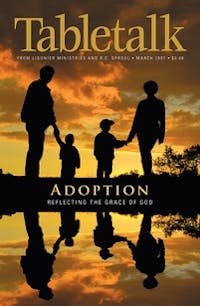
Request your free, three-month trial to Tabletalk magazine. You’ll receive the print issue monthly and gain immediate digital access to decades of archives. This trial is risk-free. No credit card required.
Try Tabletalk NowAlready receive Tabletalk magazine every month?
Verify your email address to gain unlimited access.
The serpent, who is more cunning than any of the beasts of the field, is a counterfeiter. It is his wily custom to not merely construct an alternate realm to the realm of Christ, but to craft every piece of that realm as a copy of the real. He is a mimic. Anti-Christ does not merely mean “against Christ” but likewise means “instead of Christ.” He is a false messiah of a false kingdom. And like the true Messiah, he is seeking those who would worship him. As such, he is a false prophet, a false priest, and a false king. For every blessing our Father above bestows upon His children, the Devil below has a faux blessing. And it is his unholy habit to cause us to confuse the two.
One of the telling measures of our own cultural decline is the steady erosion of a sane understanding of the family. Family, we should remember, is on one level what we call a common blessing. God has not restricted the freedom to marry and to raise up children to His redeemed. He has instead blessed all mankind with that liberty, with that calling. The serpent, however, has countless versions of the false family, a dizzying array of communities held together by base and foolish affections. He entices us to look for love in all the wrong places, to draw circles in the sand that will wash away with the tide.
Family, as family, provides a sense of belonging, of shared convictions, of common goals. The local Christian family, just like the corporate Christian family, the church, has one goal, to seek first the kingdom of God, and His righteousness. When my own family, for instance, gathers together in the evening for family worship, we come together to do what we were brought together to do. The Devil’s versions are rather anemic by comparison.
Where I live, just thirty miles north of the Bristol Motor Speedway, we have feuding clans built around particular race car drivers. There is that faux family that pulls for Dale Earnhardt Junior every race, and others that pull for Jeff Gordon. You can recognize which clan is which by the bumper stickers on the backs of their trucks. People choose their clothes, their cars, and their hairstyles all based on belonging to a family of fans of a particular driver.
Some draw their lines through their experience, seeking family in those who shared a common illness, or even a common hobby. They see themselves as united with those who have survived cancer like them, or who raise prize roses, like them.
Still others draw lines based on secondary genetic markers. They believe that their family consists of those who share a common genetic makeup. Their loyalties go to a particular skin color. These folks consider my own family to be “race traitors” because God has blessed us with a little boy whose ancestors hail from Africa. My little boy may have brown hair, brown eyes, and brown knees, but he is a Sproul, and like the rest of us, he is called to seek first the kingdom of God.
It is sad to see those outside the kingdom looking for identity, looking for belonging in such pointless ways. Sadder still, however, is that the same kinds of ties bind too many of us within the church. We call ourselves Christians, but we are more loyal to our favorite football team (and its fans) than we are to Christ and those He has bought. We call ourselves Christians, but what gets our blood pumping the most on any given Sunday is when our team advances in the playoffs. We call ourselves Christians, but we would rather spend our time with a peer group defined by age, gender, and socio-economic status. We call ourselves Christians, but we define ourselves, and those around us, by just about anything but the indwelling of the Holy Spirit.
Our Father in heaven told us all, that is, all that are His, to pray to Him as our Father in heaven. This is what defines us, as us. We are those who have God as our Father. Our lines of loyalty then are clearly drawn. My kin is not balding forty-somethings with children still at home. My kin are not those who can trace their lineage back to the British Isles. My kin are those who have been bought by the blood of the Lamb. They are my brothers and my sisters, even if they root for the wrong football team. My calling is to love them like family, for they are family. They, like me, have been born a second time, born into the family of God. We share a common Father, we share a common mother, the church, and we share a common brother, Jesus our Lord. This is now how our family is described, “But you are a chosen race, a royal priesthood, a holy nation, a people for his own possession, that you may proclaim the excellencies of him who called you out of darkness into his marvelous light. Once you were not a people, but now you are God’s people; once you had not received mercy, but now you have received mercy” (1 Peter 2: 9–10). May we by His grace live as sojourners and pilgrims, our identity held not here on earth, but with our Father in heaven. May we live as His family.
